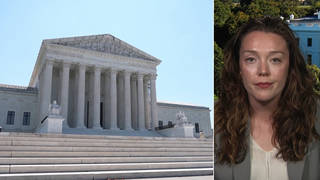
Topics
Guests
- John Nicholspolitical writer for The Nation and co-author with Robert McChesney of the new book, People Get Ready: The Fight Against a Jobless Economy and a Citizenless Democracy.
As President Obama nominates Merrick Garland to the Supreme Court to replace the late Supreme Court Justice Antonin Scalia, what will Republicans do? Garland is considered a moderate who serves as the chief judge of the United States Court of Appeals for the District of Columbia Circuit. At 63, Garland is also the oldest person nominated to the Supreme Court in 45 years. Republicans have vowed to block any Obama nominee. We spoke to John Nichols of The Nation just before the announcement was made.
Transcript
AMY GOODMAN: President Obama says he’ll announce his nominee to replace the late Justice Antonin Scalia on the Supreme Court today. Many who are watching, he will already have made the announcement. It’s at 11:00 a.m. Eastern time. Republicans have vowed to block any Obama nominee. Still with us in New York, John Nichols of The Nation magazine. Talk about what we are—the battle that’s going to go down.
JOHN NICHOLS: Well, it’s going to be a battle. In fact, you know, we’ve just spent a good deal of time talking about the presidential race. President Obama today is going to do the one thing that could push aside even Trump coverage, at least for a little bit. And that is, select somebody for this lifelong appointment on the U.S. Supreme Court. Now, we know that the Republicans have said that they will block. But this is where it gets important. There are a number of Republicans who are up for re-election this year. They’re in tough positions all over the place. And the president has a new card to play. And that is to say, if, for instance, he nominates a very mainstream, very appealing pick, who has already perhaps been approved by the Senate—and he’s got a couple on his list—if he picks one of these people, you say, “Do you, Republican senators, really want to wait and give a pick to Donald Trump, when I have just nominated a very capable person who’s been approved by Republicans in the past?” The president has a potential here to play some very smart politics and maybe move this thing beyond where it is right now.
AMY GOODMAN: So, the three that are being talked about now—and who knows if this is true?
JOHN NICHOLS: Of course.
AMY GOODMAN: Merrick Garland, Sri Srinivasan, as well as Paul Watford. Paul Watford, African American. Judge Sri Srinivasan has won unanimous support from Democrats and Republicans. He was born in India. He would be the first Hindu on the court and the first Asian American. Talk about them.
JOHN NICHOLS: Well, with Srinivasan, he’s a fascinating figure, because he’s one of these people where everyone agrees this guy is such a good lawyer, such a good—good man of the law, for lack of a better term. He really knows the turf. And there’s a universal agreement that he’d be a great Supreme Court justice. If Obama picks him, he basically is putting a marker down and saying, “Look, you know, I’m ready to have this fight this year. I want to push this. I want to get this guy on the court. And I’m willing to go senator by senator, call out their hypocrisy, challenge the absurdity of this claim that presidents cannot pick justices in the last year of their tenure, which many presidents have, and really have the fight now.” Now, that’s important to understand, because with some other—perhaps with Watford, that’s a tougher pick to sell to the Republicans. But that is a pick that I think would energize, you know, huge numbers of Americans and illustrate some of the profound challenges that you have with the Republicans.
AMY GOODMAN: I want to play a comment of Senator Lindsey Graham last week.
SEN. LINDSEY GRAHAM: We’re setting a precedent here today—Republicans are—that in the last year at least of a lame-duck, eight-year term—I would say it’s going to be a four-year term—that you’re not going to fill a vacancy of the Supreme Court, based on what we’re doing here today. That’s going to be the new rule. When y’all changed the rules about appellate judges and district court judges to get your way, I thought it was a really abuse of power. And what you have done here is you’ve made the caucuses—the Republican and Democratic caucuses are now not going to have to reach across the aisle, when it comes to appellate judges and district court judges, to get input from us, or we get input from you. So what does that mean? That we’re going to pick the most hard-ass people we can find and dare somebody in the conference to vote against that person. You’re going to have the most liberal members of your caucus pushing you to pick the most liberal judges, because you don’t need to have to reach across the aisle to get any of our input. And we’ll do the same. So, over time, the judiciary is going to be more ideologically driven, because the process in the Senate now does not require you to get outside your own party.
AMY GOODMAN: That’s South Carolina Senator Lindsey Graham. You’ve got 15 seconds, John.
JOHN NICHOLS: Lindsey Graham is just wrong. Presidents have historically picked Supreme Court justices in the last year of their first four years and even in the latter tenure—or latter part of their second term. He’s setting new rules, and then he’s accusing others of being partisan. That’s absurd.
AMY GOODMAN: John Nichols, I want to thank you for being with us. The new book, People Get Ready: The Fight Against a Jobless Economy and a Citizenless Democracy. We’ll talk about that in the future.












Media Options